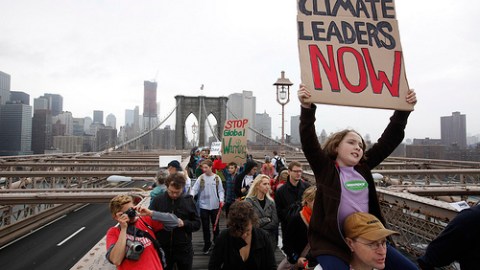As Congress Holds Climate Change Hearings, Strategies for Moving Beyond the Partisan Divide

Following Congressional hearings this week on climate change, in a guest post today Ashley Brosius considers the origins of the partisan divide on the subject and suggests several possible paths forward for overcoming ideological barriers. Brosius is a graduate student in this semester’s course on “Science, the Environment, and the Media“ — Matthew C. Nisbet.
Reconciling ideological differences can seem impossible, especially when the differences occur between the two dominant political parties. In a past Washington Postarticle on hyper-partisanship, Ron Brownstein laments that the political system “is built on exposing and inflaming the differences that separate Americans rather than the shared priorities and values that unites them.” This is certainly true of environmentalism, despite early won victories for the environment via bipartisan legislation.
A 2008 paper by Peter J. Jacques and colleagues notes that “pro-environment voting by Republicans in Congress has been declining consistently since 1990, creating a huge and growing gap between congressional Republicans and Democrats that greatly exceeds partisan differences in support for environmental protection among the general public.”
The Origins of Conservative Resistance to Climate Action
The decline in Republican support for environmental issues is not surprising in light of an analysis of conservative ideologies and values. A paper by Aaron McCright and Riley Dunlap notes that the core elements of conservatism include the primacy of individual freedom, private property rights, laissez-faire government, and the promotion of free enterprise. These values are especially incompatible with the required level of government action and regulation required of environmental protection.
The problem of climate change is even more threatening to these values due to its large-scale and global impacts. McCright and Riley state that an internationally binding treaty, like Kyoto, is “seen as a direct threat to sustained economic growth, the free market, national sovereignty, and the continued abolition of governmental regulations.”
It should then come as no surprise that there exists conservative political opposition to international legislation nor should it be surprising that there is opposition to a command-and-control climate change mitigation strategy via the Environmental Protection Act and the Clean Air Act.
So what does this mean for the future of climate change discourse? As I noted in my earlier blog post, Obama did not mention the phrase once in his State of the Union speech this year. Clearly, the phrase “climate change” was seen to be a political “third rail” that needed to be avoided.
Many believe that the term itself now has become a frame device that almost immediately evokes strong partisan resistance. Yet, a recent study by the University of Michigan showed that Republicans actually respond better to the term climate change rather than global warming. The study found that 60 percent of Republicans actually think that climate change is real, whereas only 44 percent feel that global warming is a present reality.
However, if this is the case, then why did the House committee on Science, Space, and Technology hold a full committee hearing on the science of climate change on March 31? Clearly there still remains some level of climate change skepticism and even denialism among the GOP. So if the very notion of climate change and the mechanisms needed to mitigate its impacts collide with conservative ideologies, how do we skirt irreconcilable value differences in order to come out green?
Overcoming Ideological Barriers
Democrats have already begun to talk about climate change in non-environmental terms, citing public health as a reason to allow the EPA to regulate greenhouse gas (GHG) emissions under the Clean Air Act. However, Republicans continue to counter claims about the health benefits of climate change mitigation with arguments that regulation of GHGs will discourage new jobs and stifle a currently slow economy. While it may be difficult to get GOP members to support action, no matter how much evidence is provided to the contrary, proponents of climate change action should look to capitalize on current events to herald their message.
For instance, it is difficult to argue for legislation that conservatives claim will prevent new jobs at a time when jobs in general are hard to come by. However, gas prices are on the rise and nothing moves American consumers more than a hit to their pockets.
Recent Middle East protests and instability speak to the need for independence from foreign oil. There could even be support garnered from anti-immigration advocates, since climate change is expected to yield so-called “climate” refugees due to increasing sea level rise, water scarcity due to prolonged droughts, and other uninhabitable conditions.
Yet, reframing climate change should not be used as a tactic merely to hide ulterior motives related to pushing for strong climate change mitigation measures. The links back to climate change would be made quite quickly and neither the public nor policymakers would appreciate the attempts of climate change proponents trying to pull one over on them. It would merely reinforce the polarization of the issue.
Instead, proponents need to make true alliances with their so-called opponents by speaking to our common American values before climate change becomes a permanently entrenched partisan issue like abortion.
–Guest post by Ashley Brosius, a MA student in Natural Resources and Sustainable Development at American University. Brosius holds a BA in Biological Sciences from Clemson University and her current academic interests focus on climate change adaptation and climate change communication.
This post is part of the course “Science, Environment, and the Media” taught by Professor Matthew Nisbet in the School of Communication at American. See also other posts on the climate change debate by Ms. Brosius and members of her project team.





